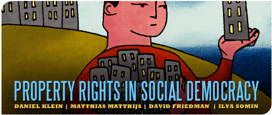On what planet has the author of this month’s lead essay of Cato Unbound been living these past thirty years? … Klein, like most libertarians, casually overlooks the fact that it is his own dogmatic libertarian thinking — centered on lower taxes, deregulation, absolute private property rights, and smaller government — that has led to the biggest economic disaster since the Great Depression; the very financial mess we are in right now.
If Matthijs believes that the trend over the past thirty years has been to smaller government, he is confusing rhetoric with reality. Thirty years ago, federal expenditures were 21.7% of GNP. In 2008, the latest year for which the Statistical Abstract provides actual rather than estimated figures, they were 21%; the estimates for 2009 and 2010 are considerably higher than that. During that same period, state and local expenditure rose from 11% to 14% of GNP. If he thinks that the trend has been towards absolute private property rights, he might want to read Kelo v City of New London.
He might also consider that what set off the “current financial mess” was the collapse of a market dominated by two firms, Fannie Mae and Freddie Mac, both created by the U.S. government.
Matthijs also writes:
[T]here is nothing “natural” either about laissez-faire capitalism or private property rights; they were both enforced by the state in the first place. … At a basic level, property rights originate from power …
The first statement is demonstrably false; private property rights predate the existence of the state. He is correct, however, that property rights originate from power. His mistake is the assumption that all power belongs to the state. Rights, to private property and much else, originate in a radically decentralized form of power, the power of each individual over his own body. For details, see my essay.

